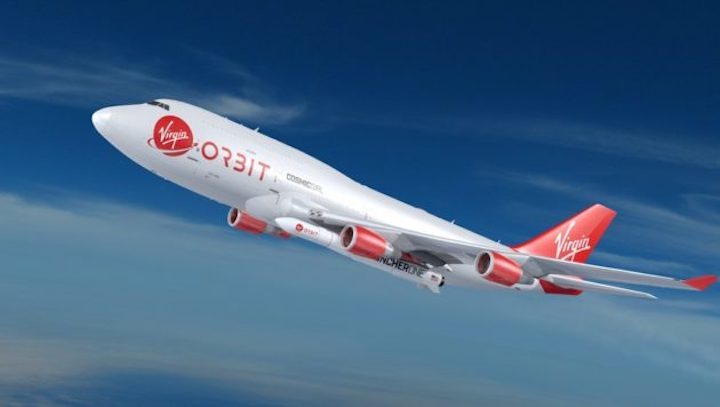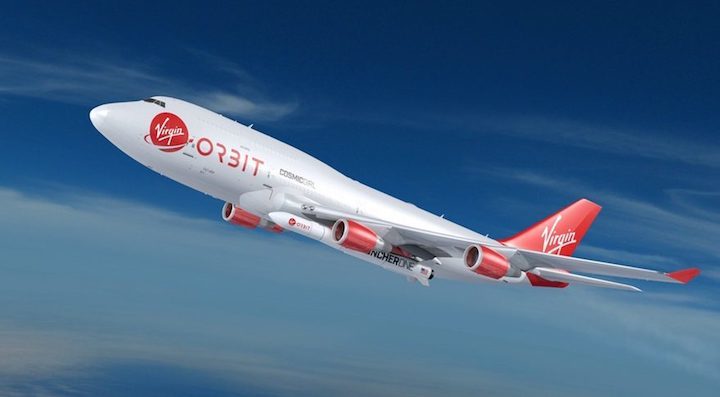27.06.2018

Seattle-based Spaceflight has a new product to offer customers who want to get small satellites up and running: Virgin Orbit’s air-launch system.
Virgin Orbit’s system, which involves sending its two-stage LauncherOne rocket into orbit from a converted Boeing 747 jet dubbed Cosmic Girl, isn’t quite ready for prime time yet. But it’s due to become available soon, and when the rockets start flying, they’ll offer Spaceflight’s clients something that’s been hard to get up to now.
Melissa Wuerl, Spaceflight’s director of business development, said her company’s customers have been asking for launch opportunities that can put small satellites into low- to mid-latitude orbital inclinations that stick close to Earth’s equator.
“We started casting about … and there just wasn’t any,” she told GeekWire.
The advantage of the Virgin Orbit system is that it can launch satellites into virtually any type of orbit. Theoretically, Cosmic Girl can take off from any runway that can accommodate a 747. Once the plane reaches its target altitude of 35,000 feet, the rocket can be released pointing in any desired direction.
That provides yet more options for Spaceflight, which makes a business out of handling the on-the-ground logistics for satellite operators looking to hitch a ride into space. So far, the Seattle company has facilitated the launches of more than 140 satellites on rockets including SpaceX’s Falcon 9, Orbital ATK’s Antares, India’s PSLV and Russia’s Soyuz and Dnepr.
Spaceflight recently added Rocket Lab’s Electron and Europe’s Vega to its rocket rideshare offerings. Now Virgin Orbit’s LauncherOne is on the menu, too.
“We’re continuing to provide the most options for customers to get their spacecraft into orbits that traditional rideshare cannot service,” Spaceflight President Curt Blake said today in a news release. “LauncherOne offers timely and targeted access to the equator and mid-latitudes, and we’re excited to provide this innovative service to our customers via this partnership with Virgin Orbit.”
Virgin Orbit aims to start launching payloads of up to 500 kilograms (1,100 pounds) to low Earth orbit by the end of the year. Spaceflight’s memorandum of understanding with Virgin Orbit reserves a rideshare mission for early 2019, with more to come.
“Spaceflight brings a proven track record of launch success, a vibrant international customer base, and a customer-centric approach,” Virgin Orbit CEO Dan Hart said. “This agreement further propels the smallsat revolution and gets us closer to realizing our vision of launching anyone, anywhere, anytime.”
Spaceflight is a service offering of Spaceflight Industries — and a sister company to BlackSky, which is gearing up to put an Earth-observing satellite constellation into orbit. Wuerl said it’s conceivable that some of those BlackSky satellites could ride LauncherOne to their orbital destinations.
Virgin Orbit has said the cost of a launch would range somewhere around $12 million, and Spaceflight’s rideshare model would spread that cost among multiple customers. Because so many variables determine what Spaceflight’s customers need, Wuerl shied away from naming precise prices for launch services. However, she said the versatility of Virgin Orbit’s launch system could command a premium.
Wuerl mentioned another competitive factor: the pizazz and perks that are a specialty for British billionaire Richard Branson’s Virgin brands.
“You know it’s going to be an experience,” she said.
Quelle: GeekWire
---
Update: 2.07.2018
.
Virgin Orbit wins FAA license for first LauncherOne mission

WASHINGTON — Virgin Orbit has received a license from the Federal Aviation Administration for the first launch of its LauncherOne vehicle, which the company hopes to perform later this summer.
The FAA issued the license June 29 for the first launch of the air-launch system, using the LauncherOne rocket flown from a customized Boeing 747 that takes off from Mojave Air and Space Port in California. The payload for that launch is identified as a “mass simulator with CubeSat,” but doesn’t specify the identity of the cubesat or cubesats that will fly on the mission.
The FAA license is for a reusable launch vehicle (RLV), even though LauncherOne itself is expendable. The Boeing 747 used as the launch platform is reused, but Northrop Grumman’s Pegasus rocket, which is also an air-launched system, is licensed as an expendable launch vehicle by the FAA.
The company didn’t explain why it received an RLV license for the launch, but others in the industry note that the RLV licensing process offers a more flexible performance-based approach, where launch operators are able to select their preferred approach to meeting safety criteria, versus the more prescriptive approach used for expendable launch vehicles. Ongoing licensing reforms, called for by Space Policy Directive 2 in May, are expected to move to a performance-based approach for all vehicles, not just RLVs.
The license comes as the company is preparing to perform a captive carry test as soon as later this week. In a speech at the NewSpace 2018 Conference June 27, Stephen Eisele, vice president of business development of Virgin Orbit, said the company was current installing the pylon on the left wing of the 747 that will hold the rocket.
While Eisele said at the conference that Virgin Orbit could perform just a single captive carry test flight, the company said in a series of tweets June 29 that a campaign of such flights was planned. First, the company said, the 747 would fly with the pylon attached, but without a LauncherOne vehicle.
After that will come flights with a “fully integrated” LauncherOne, culminating in a drop test. “On that rocket’s final flight, we’ll run one more key test: dropping the rocket from Cosmic Girl,” the company said, referring to the 747. “It’ll free fall all the way back to Earth, collecting data all the way.”
If successful, the tests would allow Virgin Orbit to proceed with its first orbital launch attempt, which Eisele previously said the company hoped to conduct by the end of the summer. “This test campaign will be some of the hardest but also the most fun stuff we’ve ever done,” the company tweeted. “It’s going to be an awesome couple of weeks.”
Quelle: SN
